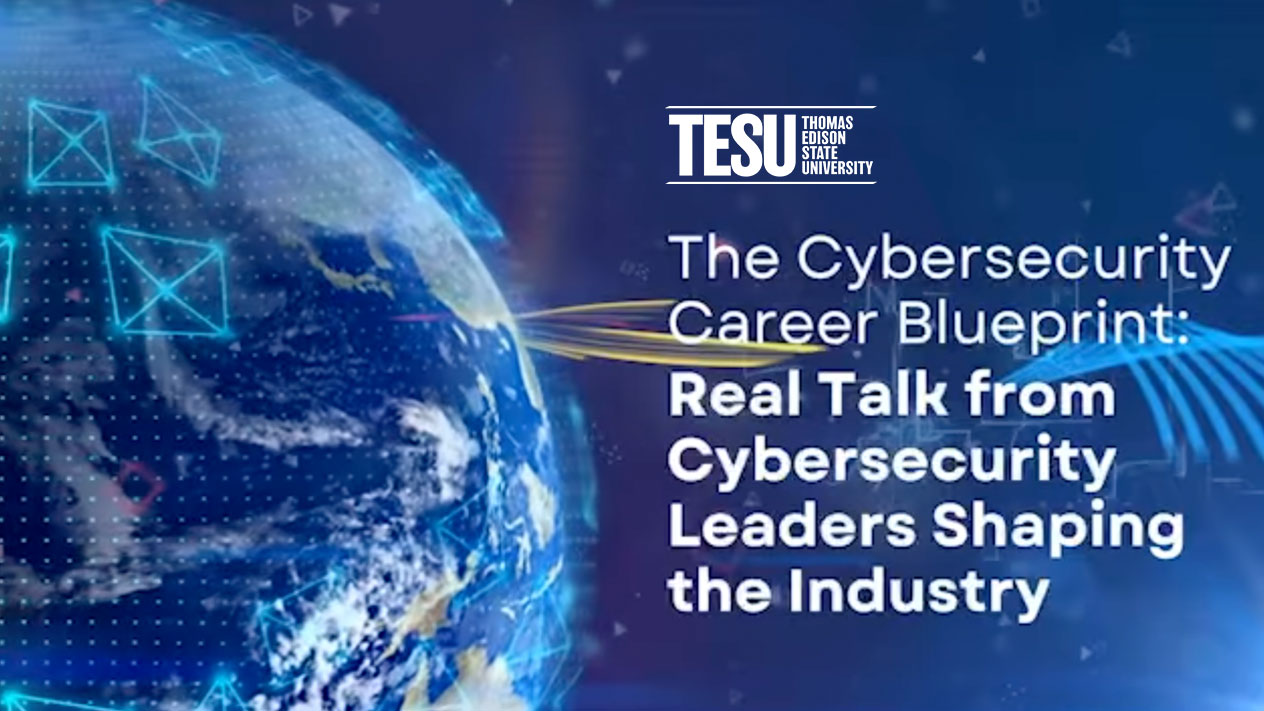The Cybersecurity Career Blueprint: Real Talk from Cybersecurity Leaders Shaping the Industry

Expert panel explores cybersecurity threats and career pathways
In recognition of Cybersecurity Awareness Month, Thomas Edison State University hosted a panel discussion bringing together cybersecurity experts, educators and practitioners to address one of the most pressing questions of our time: How do we protect ourselves, our organizations and our infrastructure in an increasingly digital world?
The conversation brought together an impressive lineup of experts who shared candid insights about emerging threats, defensive strategies and what it takes to build a career in this critical field.
 Play video
Play video
Meet Our Expert Panelists
The discussion featured voices from across the cybersecurity ecosystem:
- Dr. Saeed Esmaili Sardari, Associate Dean of the School of Science and Technology — Dr. Esmaili Sardari is an experienced academic leader specializing in electrical and computer engineering, machine learning and advanced data analytics.
- Dr. Henry Collier, Dean of the School of Science and Technology — Dr. Collier is an internationally recognized cybersecurity expert specializing in the human firewall, AI and networking. He currently leads global research on cultural factors influencing susceptibility to cybercrime.
- Dr. Susan Cole, Information System Security Officer — Dr. Cole brings over a decade of hands-on cybersecurity experience spanning incident response, policy development and security operations. She holds a Ph.D. in Information Assurance and has been teaching cybersecurity professionals since 2012, currently serving as a mentor at TESU.
- Dr. Denise Kinsey-Bergstrom, Program Chair for Cybersecurity at Franklin University — Dr. Kinsey-Bergstrom brings over 20 years of experience in computer networking and cybersecurity for both government and private sector clients. She also serves as a mentor at TESU.
- Michael Geraghty, Chief Information Security Officer, State of New Jersey and Director, NJ Cybersecurity and Communications Integration Cell (NJCCIC), B.A. ’09 — Geraghty leads the development and execution of the State’s cybersecurity strategy, including operations, governance, risk and compliance and incident response.
- John Rosario, Network Operations, 365 Data Centers, M.S. in Cybersecurity ’25, B.S. in Cybersecurity ’24, AAS ’22 — Rosario is a network and data security professional who accelerated his career by completing both his bachelor's and master's degrees in cybersecurity through TESU’s Accelerated Bachelor’s to Master’s Program.
Why Everyone Should Care About Cybersecurity
The panel's message was unanimous: cybersecurity is everyone's responsibility, not just the IT team's. Collier emphasized that humans are the number one target for threat actors. While hacking equipment takes days or weeks, convincing someone to fall for a phishing attempt takes far less time.
Michael Geraghty stressed that individuals must take ownership of their security posture, protecting both themselves and their organizations from cyber threats.
The Evolving Threat Landscape
AI as a Double-Edged Sword: Collier explained how AI enables both powerful defenses and sophisticated attacks. Threat actors use AI to develop malware that evades detection and create social engineering schemes indistinguishable from legitimate communications.
Nation-State Threats: Cole discussed Advanced Persistent Threats — well-funded adversaries, typically nation-states, seeking long-term network access. Geraghty shared eye-opening statistics: China's MSS has 10 times more hackers than the FBI has agents, targeting critical U.S. infrastructure including telecommunications, energy and water systems.
Ransomware Syndicates: The panel explored financially motivated cybercrime groups. Geraghty highlighted the "Scattered Spider" arrests — teenagers aged 17-22 who hacked MGM and Caesars through social engineering, with one 22-year-old amassing $200 million.
It's not necessarily how valuable you are, it's how vulnerable you are."Michael Geraghty
Hear detailed threat discussions in the full video
The Human Factor
One of the most compelling segments focused on how attackers exploit human psychology. Collier, whose research examines cultural factors influencing susceptibility to cybercrime, explained that behavioral characteristics like being absent-minded, preoccupied or overconfident can lead to poor security decisions. AI has supercharged traditional scams —Rosario noted that just 10-20 seconds of audio from social media enables attackers to clone voices for impersonation attacks.
Practical Defense Strategies
Multi-Factor Authentication (MFA): The panel unanimously agreed MFA is non-negotiable. Geraghty cited statistics showing 81% of hacks involve compromised credentials — attackers logging in as legitimate users. The N.J. Cybersecurity and Communications Integration Cell sent 57,000 credential compromise notifications in 2025 alone, with universities having more compromised passwords than all other sectors combined.
Password Best Practices:
- Use complex passwords — 8–12-character passwords crack in under 5 minutes
- Create passphrases for easier memorization and stronger security
- Use false answers for security questions
- Apply the "Panther Method" — use creative alternatives (e.g., “black cat” for “panther” to refer to a mascot)
Protect Your Digital Footprint: The panel cautioned against oversharing on social media, where innocent posts provide security question answers or voice cloning material.
Building a Career in Cybersecurity
Technical Background Required? Cole shared her journey from linguist to cybersecurity professional—technical background helps but willingness to learn is essential. Collier emphasized that while non-technical people can succeed, they must master networking, coding fundamentals and system operations.
Embrace Failure: All panelists stressed that cybersecurity professionals must be comfortable with failure. The field is too complex to know everything or get things right immediately.
The Gaming Mindset: Rosario drew a parallel to gamers: gamers don't quit when losing, they persist until they win. That same dedication applies to cybersecurity, requiring daily practice studying, working in labs and practicing configurations.
Finding Your Niche: Kinsey-Bergstrom offered an inclusive perspective — there's a place for everyone in cybersecurity, whether deeply technical or applying cyber principles to psychology, criminal justice or law.
Key Takeaways
- Cybersecurity is everyone's responsibility
- Use MFA on all accounts without exception
- Think before clicking — assess urgent requests carefully
- Guard personal information strategically
- Master fundamentals — networking, systems, coding basics
- Embrace failure as learning
- Practice consistently — mastery requires daily engagement
- Find mentors in the cybersecurity community
Don't Miss This Essential Discussion
This summary captures highlights, but the full 60-minute panel offers specific case studies, detailed technical discussions, career stories, Q&A segments and a dynamic interaction among cybersecurity professionals. Whether you're considering a cybersecurity career, advancing your IT skills or protecting yourself online, this discussion delivers actionable insights.
Additional Resources
For Cybersecurity Awareness Month:
- Visit CISA.gov for resources and best practices
- Check out the National Cybersecurity Alliance at StaySafeOnline.org
Professional Organizations Mentioned:
- ISC² (CISSP Certification)
- Capture The Flag (CTF) competitions
- Security conferences and research symposiums
